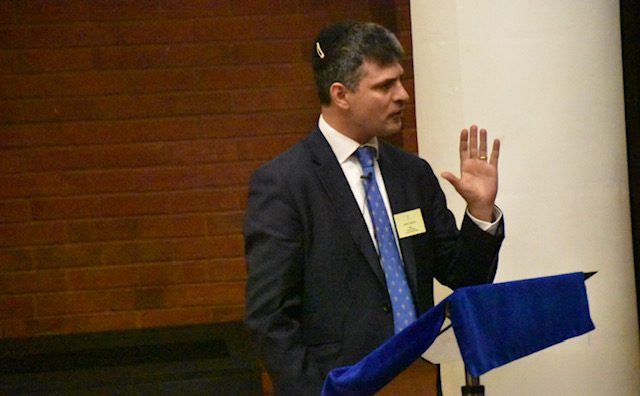Jeremy Havardi is the Director of the B’nai B’rith UK’s Bureau of International Affairs (BBLBIA). In this candid essay he tells of four things he has learned from sitting down with the world’s diplomats and discussing their views on Israel, the conflict, antisemitism and BDS.
It was while sitting opposite one of the chief European architects of the Iranian nuclear deal that I realised the significance of my job. The Ambassador had played an important role in drafting clauses of the controversial agreement known as the JCPOA and it now faced a serious challenge from the Trump administration. I was there to argue that this was an opportune time to reconsider the deal, fix its flaws, which included a failure to address Iran’s regional aggression, and put in place a new diplomatic architecture backed by financial penalties and incentives. The Ambassador responded in a cool and composed manner, arguing that while Iran’s criminal behaviour in the Middle East was a major concern, the deal was never intended to fix it. We had to agree to disagree.
That diplomatic meeting was just one of many that have been carried out by the London Bureau of International Affairs, the advocacy branch of the UK section of B’nai B’rith International (BBI). BBI, the global welfare and human rights organisation headquartered in Washington, is the oldest Jewish service organisation in the world. It has a long history (177 years and counting), members in 59 countries and representatives at the UN in New York, the UNHRC in Geneva and UNESCO in Paris. BBI is committed to defending Jewish interests around the world: fighting antisemitism in all its guises and demanding action against prejudice; calling for an end to restrictions on Jewish religious practice such as animal slaughter and defending Israel from malicious misrepresentations and ignorance. We also fight against intolerance directed towards minorities, whether persecuted Christians in the Middle East or the Roma in Europe.
For more than 20 years, the London Bureau has been engaged in a strategic dialogue with London’s diplomatic and political community (and missions abroad) in order to advance these interests. Once a year, the international organisation attends meetings at UNESCO to take on the members’ rabid anti-Israel agenda and does the same in Geneva at the first of the three annual sessions of the UN Human Rights Council. The London Bureau has also taken to task UK government departments, in particular the Department for International Development (DFID) over its funding of the Palestinian Authority, and a number of NGOs and charities, including Oxfam and Amnesty. Just in the last four years, London Bureau team members and I have seen over a hundred diplomats from some 60 countries, including Ambassadors and High Commissioners from nations as diverse as Germany, Spain, Mexico, India, Egypt, Singapore and South Africa. It has sometimes been a chastening experience.
I have formed four impressions about how some diplomats perceive and misperceive Israel and antisemitism in these encounters, which I set out below.
First, there is only a limited understanding of antisemitism
Despite their decades of political experience and involvement in public policy, senior diplomats often have a restricted understanding of antisemitism. They can grasp how it is manifested in acts of physical violence against Jewish people and property, together with violent and non violent threats to the community. They appreciate that resurgent right wing nationalism in Europe has been accompanied by attempts to deny or minimise the Holocaust, and that the prejudice thus exposed is a potentially destabilising force within their societies.
Some also perceive, albeit dimly, that left wing attitudes to Israel can reflect age old antisemitic stereotypes and that within the anti-Israel movement are many people who are animated by bigotry. But what some do not see is also interesting. Surveys from the Anti-Defamation League, an NGO founded by B’nai B’rith in 1913, show that a significant percentage of modern Europeans believe one or more of the following: that Jews have too much control of the banking system; that Jews are more loyal to Israel than to their own countries or that Jews exploit the Holocaust for their own ends. Some diplomats have questioned whether these are antisemitic attitudes or have disparaged the evidence. In one case, a European ambassador suggested that Jews should regard the widespread belief in Jewish banking control as a compliment, given that it showcased the Jewish community’s tremendous professional success. (The idea that antisemitic attitudes might then feed into antisemitic assaults and violence was lost on him).
Another European diplomat asked if members of the B’nai B’rith team in front of him were ‘British or Jewish,’ echoing the canard that Jews must have a separate nationality from that of the country they were living in. Another Ambassador suggested that the prevalence of antisemitic attitudes in his country stemmed from the ‘aggression’ of Israeli policy in Gaza, shifting the focus of blame from the perpetrators of antisemitism to its victims.
In Europe, the influence of Islamism and Salafism in stirring anti-Jewish hate is hard to miss. Recent surveys have found that many attacks on Jews in Europe have been carried out by people of Arab and Muslim background as well as by the far right. Yet one senior European diplomat, tasked by the EU to monitor antisemitism, admitted to me that explanations invoking ‘the Islamist element’ could not be released into the public domain for fear of the domestic repercussions.
We have also had issues with friendly European countries. In a meeting with a member of the so called Visigrad Bloc (Czech Republic, Slovakia, Hungary and Poland), the Bureau challenged the language used to condemn the financier George Soros, language which clearly invoked age old stereotypes about Jewish manipulative control and sinister global influence. The minister, with a reputation for taking offence at any criticism of his country, bristled at any suggestion of state sponsored antisemitism and doubled down on his views. The atmosphere in that meeting was one of the frostiest I have ever encountered.
B’nai B’rith’s role in these discussions is partly educational, highlighting to those we meet the scope, depth and penetration of antisemitic attitudes, actions and perspectives around the world. At the same time, we urge nations to sign up to the IHRA definition of antisemitism, which now has over 30 signatories.
Second, attitudes to Israel are changing fast in the Muslim world
It is clear to us that Israel is forging stronger links in parts of the Muslim world, especially in intelligence and defence. Diplomats from these countries are more than aware of what Israel can offer their nation in terms of advanced hi tech, security infrastructure, military hardware, medical technology, pharmaceuticals and intelligence as well as a plethora of products for their domestic markets. They also fully recognise the hostile environment created by the ‘Shia axis,’ led by the Iranian regime and including its terror proxies in Lebanon (Hezbolah), Yemen (the Houthis), Syria and Gaza as well as non-state terror actors, such as ISIL and Hamas. As Israel is Iran’s most powerful opponent in the region, the adage that ‘my enemy’s enemy is my friend’ has taken on new meaning.
We have met diplomats from across the Muslim world, including Egypt, Jordan, Turkey, Bahrain, Kosovo and Azerbaijan and these encounters are often positive. One of Kosovo’s Ambassadors told us that his country was the most pro-US nation in Europe as the American administration in 1998 had saved his people from genocide. He went on to say that this would help cement future ties with Israel as the Israeli population was similarly well disposed towards American values and the way of life. It should not be forgotten that Kosovo (95 per cent Sunni Muslim) is a secular state with a strong belief in religious tolerance that is upheld in the Constitution.
Albania too is well disposed towards its Jewish community and Israel. One of its western diplomats explained that this may owe something to the relatively moderate interpretations of Islam that have historically prevailed in the country, including a law from 1925 which bans face covering. The tendency, as he put it, was for people to see themselves as Albanian and to be defined collectively, in national rather than religious or sectarian terms. This change in tone does not yet automatically translate into support for Israel at the UN, given how mindful some of these countries are of pressure from other Muslim nations. Nonetheless, the signs are surely encouraging. The Muslim world is not in a state of permanent war with Israel.
That said, there are some countries where more extreme views still have a visceral appeal and this is as true at the diplomatic level as it is at the grassroots. In one meeting with an Arab Ambassador from a ‘friendly’ country, Bureau members were informed, somewhat authoritatively, that a Jewish temple never existed in Jerusalem. The Ambassador told us that he had read an article from the Smithsonian Institute backing up this historically illiterate claim, one which he believed with the utmost sincerity. In what amounted to a diatribe laden with conspiracy theories, he went on to blame Jewish extremists for throwing rocks at worshippers on the Western Wall and proclaimed that before 1948, Jews and Arabs had always lived in peace in the region. A couple of years later, his successor made it clear that the Israeli-Palestinian impasse was at the heart of all the Middle East’s woes and that the Jewish state was to blame for its continuation, views which were echoed by the country’s representative at the UN Human Rights Council. Another Arab Ambassador denied that Hamas was a terrorist organisation and that his country’s antisemitism started with the creation of the Jewish state.
Third, Europe is far from unified when it comes to the Arab-Israeli conflict
The notion of a ‘unified European position’ on the Arab-Israeli conflict is sometimes overstated. Granted, all EU member states share the belief in a negotiated outcome to the conflict based around ‘two states for two peoples.’ All express their belief in Israel’s right to exist while condemning terror and all welcome their social, cultural and economic ties to the Jewish state. The EU has often strongly criticised the IDF’s actions in war, labelling them ‘disproportionate,’ and tends to see Israeli settlements, which are classed as illegal, as a primary barrier to achieving peace.
However, beneath that consensus, we see a fracture between the nations that Donald Rumsfeld, George Bush Junior’s former US Defence Secretary, once called ‘old and new Europe.’ Attitudes towards Israel in France, Belgium, Spain, Holland, Luxembourg and the Nordic nations are often strikingly less warm and understanding that those found in Greece, Cyprus and some nations in the former Yugoslavia, as well as the Visigrad bloc.
Some of old Europe’s smaller nations have provided us with interesting diplomatic experiences. At the end of a meeting in Geneva with one of Europe’s Francophone nations, we were given an official statement offering an overview of the Israeli-Palestinian conflict. There was much criticism of settlement policy and the ongoing occupation, as well as Israel’s Gaza policy. After asking if there was even one sentence criticising the conduct of Hamas and Fatah, an extended blank stare was followed by a simple ‘no.’ One of the Nordic embassies we visited tried to justify a longstanding ban on Jewish animal slaughter on the grounds of welfare concerns. When we pointed out that its countrymen had the freedom to simultaneously engage in whale hunting, this was dismissed with a shrug.
In the countries that were liberated from communist rule nearly thirty years ago, there is a much more positive attitude to the Jewish state. They view Israel as a newly established democracy which values its culture, heritage, language and identity. In a postmodern Europe beset by the ideologies of multiculturalism and secularism, they look to Israel as a nation that proudly defies this trend and displays respect for its national traditions without apology.
Naturally, they also see Israel as a bulwark against a radical Islamist threat that has convulsed European cities in recent years. In a meeting with a minister from one of the Visigrad Four, we were told that it was necessary to resist ‘the Muslim invasion of Europe,’ and that Israel was, by implication, a model for such resistance. We countered the language here, also pointing out that with its sizeable Muslim minority, Israel could hardly be described as an Islamic free zone. The further protestation that this lack of nuance lumped together Salafists with democratically inclined, anti-radical Muslims cut no ice. Of course, what Israel has done is resist waves of terror from extremist Muslim and Arab forces in the region.
Pro-Israel attitudes can also co-exist with deepening antisemitic viewpoints. Nowhere is this better seen than in Poland and Hungary where right wing governments have courted the support of nationalists who are intent on rewriting their country’s narratives. This has resulted in a Polish law that makes it an offence to imply complicity in the Holocaust by the wartime state and nation. B’nai B’rith was one of a number of Anglo-Jewish organisations that met a Polish minister to express its alarm at such developments. We made the point that it was always dangerous for the state to be the arbiter of history and, even worse, to penalise others if they deviated from ‘state history.’ Eventually, the penalties within the law were watered down.
Finally, the EU’s ability to deal with anti-Israel resolutions at the UN Human Rights Council in Geneva also leaves much to be desired. EU diplomats in that august chamber generally do not reject biased and one sided anti-Israel resolutions. One senior EU diplomat at the UN Human Rights Council explained that the EU representatives prefer to water them down to make them more palatable, then insist that they vote for them in what seems like a judicious compromise. In response to the charge that these EU votes for Article 7 resolutions only helped entrench the crippling bias of UN institutions, he was unmoved. That the UNHRC is not an unbiased player in the conflict is not denied by even the most senior figures at the UNHRC, as was made clear in one of my conversations with the Council’s Chef de Cabinet (Chief of Staff). The fact that the UNHRC, like its predecessor body, still suffers from an endemic obsession with demonising Israel, an obsession to which the EU still gives its blessing, apparently matters little.
Fourth, there is little support for either BDS or annexation
Outside the Middle East and with the exception of some leftist regimes, there is little appetite for the BDS (boycott, divestment and sanctions) movement at a governmental level. The campaign, one which aims to weaken and destroy Israel by encouraging other nations to isolate it, is rightly seen as a one sided attack on Israel and an unhelpful attempt to undermine the chances of a viable Middle East peace. Some parties of the centre left (i.e. Quebec Solidaire) endorse BDS but they scarcely constitute a majority anywhere.
One notable exception came in a meeting with a leading African nation where Israel was accused of practising apartheid policies. There was support for boycotting Israel and for preventing its MKs from visiting the country. It was immediately pointed out that Nelson Mandela, a man who knew apartheid better than anyone, himself declared that Israel was not practising this policy, even though he expressed sympathy for the Palestinians. This example struck me vividly because it was the only time that we have had to defend the Jewish state against such egregious charges.
There is equally little support for an Israeli annexation of the West Bank or for unilaterally changing the status of Jerusalem. Support for a two state solution is close to sacrosanct within the international community, despite all the turmoil engulfing the region. Even among Israel’s most ardent supporters, there is a belief that settlements complicate the search for a viable agreement and that tough compromises are necessary from both sides. B’nai B’rith’s position is to advocate for a just and lasting peace for both Israelis and Palestinians while also fighting the injustices faced by the region’s many minorities.
We argue, however, that in order to achieve a just and durable peace, incitement in the territories must be ended together with talk of a Palestinian right of return to Israel. One body that promotes the right of return with almost messianic zeal is UNRWA, the UN Relief and Works Agency for Palestine refugees, which is funded generously by the UK and other governments. However, when the issue of UNRWA funding is raised with diplomats and with DFID, they respond that the Israeli government itself does not want the agency to disappear or be defunded. Without UNRWA, they say that Israel would have to assume responsibility for Palestinian civil society, a task it is unwilling to take on. Worse, a DFID official has even denied to our faces that UNRWA is guilty of antisemitic incitement or that it has departed substantially from its policy of neutrality. There seems to be a curious blindness at work here.
When talking about Israel: three pointers
The first lesson is that diplomats are more concerned with the present day than with history lessons. They cannot envisage justice based around century old treaties which exclude the needs and concerns of current parties.
Secondly, it is important to argue for specific issues such as asking for a country to sign up to the IHRA definition or condemn antisemitic cartoons produced by Hamas. Such concerns can be passed back to the country’s respective Foreign Ministry for consideration and feedback while more general problems are less likely to gain much attention.
Thirdly, and this is stating the obvious, the success of any discussion is directly related to the quality of the research carried out beforehand. It is vital to give diplomats hard data and evidence to back up an argument, not just generalised soundbites. For any country, it helps to understand domestic policy constraints, where the balance of power lies, the agendas of different political parties and prevailing public opinion. One should try to understand how a nation’s Middle East foreign policy relates to geopolitical developments as well as domestic policy concerns. Without this information, our meetings would be less successful.





































This is the most comprehensive explanation of why the European diplomats are obstinate and behave pro-Palestinian and anti-Israel.